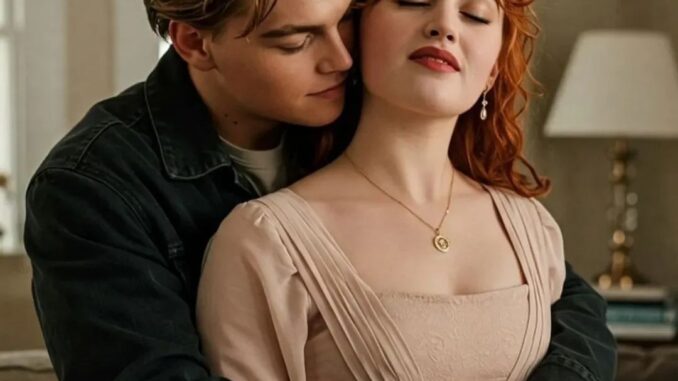
The Unseen Act: When Jack Dawson Almost Lost His Cool
The very premise is a fascinating whisper down the corridors of cinematic history: James Cameron, the architect of impossible dreams, and Leonardo DiCaprio, the rising star who would soon become an icon, locked in a creative tug-of-war over a single scene in the grandest romance ever told. While the specific “md02” identifier remains an enigmatic tag, the core idea – that even the most dedicated actor might plead for the removal of a scene – illuminates the delicate alchemy of filmmaking, the relentless pursuit of character truth, and the unseen battles fought to preserve an iconic performance.
Titanic was not merely a film; it was a phenomenon, a crucible of ambition, technology, and raw emotion. For Leonardo DiCaprio, stepping into the role of Jack Dawson was both an unprecedented opportunity and an immense pressure. Jack was the everyman hero, the charming rogue, the artist with a free spirit who, despite his humble beginnings, captivated the aristocratic Rose DeWitt Bukater. His appeal lay in his authenticity, his unvarnished passion, and a certain unaffected coolness. It is precisely this carefully cultivated image that makes the hypothetical “unhandleable” scene so compelling to imagine.
What could possibly make Leonardo DiCaprio, known for his commitment to his craft, recoil and “plead to remove” a moment from such a pivotal role? It wouldn’t be a physically demanding stunt; DiCaprio embraced those. It wouldn’t be a moment of raw emotional vulnerability; that was his forte. No, the scene, one imagines, would be something far more insidious to a young actor trying to etch an indelible character into the public consciousness: a moment of uncharacteristic awkwardness, forced sentimentality, or a jarring stumble into cliché that threatened to break the spell of Jack’s effortless charm.
Imagine this: a scene, perhaps set in the opulent First-Class dining saloon or during a slightly over-the-top steerage party, where Jack, swept up in the intoxicating delirium of new love, attempts a grand, public declaration of affection for Rose. Not the intimate, artistic intensity of the drawing scene, nor the spontaneous, life-affirming thrill of the “I’m flying” moment. But something more. Perhaps Cameron, in his relentless pursuit of maximizing the emotional stakes, conceived a moment where Jack, fueled by champagne and burgeoning confidence, attempts a spontaneous, slightly ill-conceived musical performance – a love song he improvises on the spot, perhaps with overly earnest, slightly off-key vocals, or an impromptu, clumsy dance intended to sweep Rose off her feet but instead makes him look foolish.
This wouldn’t be the charming, natural exuberance of the steerage dance, but something staged, something that felt performative rather than authentic. It might have been a scene where Jack, attempting to prove his worth or artistic prowess in a way he believed Rose’s world expected, tried too hard. Perhaps he recited an overly saccharine poem he’d hastily penned, or attempted a grand, public gesture of protection for Rose in a situation that didn’t truly warrant it, making him appear clumsy or overly dramatic.
The reason for DiCaprio’s hypothetical plea wouldn’t be mere personal embarrassment, though that would play a part. It would be a fierce, protective instinct for his character. He would argue, one can envision, that such a moment would ring false. It would be an inauthentic note in Jack Dawson’s otherwise genuine melody. Jack was cool, yes, but he was also grounded. He was artistic, but his art was natural, not forced. An overly earnest, slightly cringeworthy public display would undermine the very essence of what made Jack so appealing – his integrity, his effortless charisma, and his refusal to be anything but himself.
Cameron, the visionary director, known for his unwavering conviction, might have seen it as a moment of heightened romantic comedy or a deeper dive into Jack’s vulnerability. But DiCaprio, living and breathing Jack, would intuit that it was a step too far, a moment that risked turning a romantic hero into a slightly pitiable figure. The actor, in inhabiting the role, becomes its fiercest guardian, understanding its internal logic more intimately than even the director might in a single moment.
If such a scene indeed existed and was excised, its removal would be a testament to the collaborative spirit of filmmaking and the wisdom of an actor’s intuition. It would underscore the idea that sometimes, less is more; that the power of an iconic character lies not just in what they do, but in what they don’t do, in the subtle integrity of their actions. The hypothetical “unhandleable” scene, therefore, illustrates the unspoken battles fought to preserve authenticity, ensuring that the magic woven by filmmakers and actors alike remains untarnished, allowing a legend like Jack Dawson to forever sail smoothly into the hearts of audiences, free of any false notes or awkward stumbles.